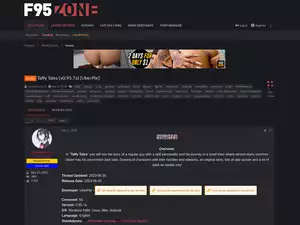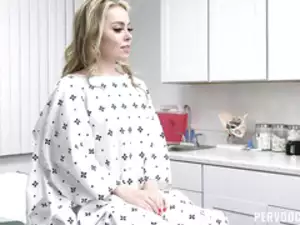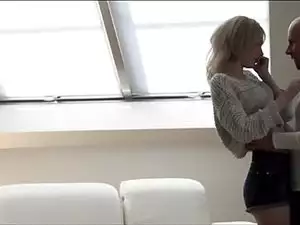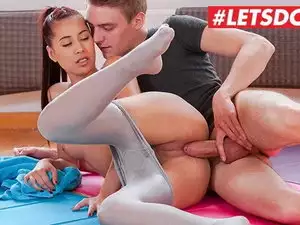Bawdy Tales of Old London Town part 1
- 3 years ago
- 26
- 0

 4 years ago
4 years ago
Synopsis: Using her lethal skills, a young, beautiful slave rises to power in ancient Rome. Tales 2 is a character study of a complex and murderous femdom. 109 pgs. Tales of Ancient Rome 2: Salidia and Lydia by TG Chapter 1 Laying in Supplies "Oh, this feels so good," Salidia...
 1 year ago
1 year ago
If you have ever played a turn-based RPG and thought to yourself, “this, but with chicks with dicks,” first of all, splash some cold fucking water on your face. After that, consider yourself a porn prophet of debauchery, because that’s exactly the kind of game you are going to find in Tales of Androgyny. You won’t find any teenage male heroes here like in your favorite animes. This is all about exploring a world full of androgynies people that are as horny as they are hung.Before you jump into...
Free Sex Games 3 years ago
3 years ago
Mare's Tales: Chapter 35 ? By: Beverly Taff Hello Dear Readers. I apologise if I seem to have been away from the story board for an inordinately long time. I have been writing another story in another genre on the Nifty Gay Caf? Site. This story is called Two by Two and it addresses other issues that are not to the taste of many readers on the Fictionmania site. 'Two by Two' runs to 15 chapters in the Bestiality section of the Nifty Gay Caf? site. It is a 'Carry on' from t...
 3 years ago
3 years ago
Introduction.Here we are. You and I. Together in this special place out of the rain.The dusty air is thick with the aroma of storytelling as we make our way between row upon row of well-thumbed books that pack each straining shelf to the heavens.Book upon book stuffed with tales both fact and fiction. At the end of each row is a sign revealing the nature of these tales for the inquisitive to peruse. The theme for this particular row says "Victoriana - Fiction from a golden age."Wandering...
MILF 3 years ago
3 years ago
It doesn’t matter what you were doing before, but when you blinked, you were suddenly in the back of a bookstore. You know this bookstore, it’s the one closest to your house, and you’ve been to it plenty of times, though not often in this section, the children’s section. “What am I doing here?” You ask aloud, looking outside the window to discover it was the middle of the night. That’s when you remember the last thing you were doing was going to bed, and just as you were closing your eyes, you...
 2 years ago
2 years ago
Tales of the Restored American Commonwealth4072: The YardsByEmily DanielsTales of the RAC: 4072: The Yards Chapter 1: The Verdict Chapter 2: The Yards The Yards is the second chapter in the 4072 saga of the Tales of the Restored American Commonwealth. The story begins with 4072: The Verdict. If you would like to know more about the setting of the Restored American Commonwealth you can learn about it, purchase previous chapters and interact with characters by going to...
 2 years ago
2 years ago
Synopsis: Salidia's Little Lion, Lydia, sparks a fight with neighbors, and she picks up a bow to become Hell on Horseback to protect those she loves. Out of the fires of this conflict, they forge the place that became known as the Valley of the Amazons. Action story with Femdom leads. `165 pgs. Tales of Ancient Rome 3: Lions in the Valley By TG Chapter 1 ...
 3 years ago
3 years ago
This is the an experimental set of tales written in the style of Chaucer's Canterbury Tales. It relates the story of several youths on a Pilgrimage to some far-off land. If this experiment is a success I shall continue this endeavour. Samantha: The Tales by Samantha THE FIRST TALE as told by AMY I tell you a tale, as time of old When I was not brave or gallant or bold But rather a lonely boy of school For not one friend could recognise the jewel Of promise my unfortunate male...
 3 years ago
3 years ago
Cross-Dressed Fairy Tales Part 3 By Dawn DeWinter In parts 1 and 2, Sherry and Sadie, two married men, went to a lesbian bar on their "girl's night out." There they came into the clutches of Mike and Big Sue, and are in danger of being raped - or worse - if Sherry cannot keep Big Sue entertained with "original" stories. This task has just become a mite more difficult with the arrival of two more people. Can they too be kept satisfied? Part 3 is based on Pinocchio, the story of the...
 2 years ago
2 years ago
Some familiar fables transformed for readers of transgendered tales. In part 1, Sherry and Sadie, two married men on a "girl's night out" visit a lesbian bar and go home with Big Sue and Mike, two women who are dangerously upset to discover that they've been seduced by two cross-dressed males cheating on their wives. Like Sheherazade in the Arabian Nights, Sherry decides that the only way to protect their -- um, posteriors, is to entertain Big Sue with fabulous stories. ...
 4 years ago
4 years ago
Jock Tales---Senior Year---Final Game—and The Price of SuccessOK—so the last two chapters of the Jock Tales series won't have much porn to them—just a couple of mentions of stuff. If you have been following the series story line, as much as the porn parts, then these last two chapters simply tie up the series, and bring it to it's conclusion. Thank you to all the fans, and comments, and if you wish to continue, then join me for the next series—The Skatepark Adventures. The next four games after...
 4 years ago
4 years ago
© 2002 all rights reserved. Intro The '80's, a decade to remember: Post pill, pre AIDS. Gloria Steinham making waves eagerly surfed by the assertive, independent women of San Francisco. "A woman needs a man like a fish needs a bicycle," was a popular paraphrase, often attributed to Steinham, but the source is Australian Irina Dunn. The best rebuttal I'd heard, in a crowded Union Street meat market bar, was: "Yeah, but fish don't have cunts that enjoy a ride on a sturdy...
 4 years ago
4 years ago
Feeling guilty that it's been so long since I've posted a new story ("G.E.N.E.S.I.S." a few months ago), I found some time over the past couple of nights and came up with this little trio of stories. Inspired by a familier TV show with a similar name (Tales from the Crypt), these stories are a spoof on male chauvinists and what I'd love to do to them if I had a little magic wand to "ZAP'em" with! Although I do have a couple of other idea's in the hopper, this will have to do until...
 2 years ago
2 years ago
First Name = Hero (Male) Last Name = Sidekick (Female) It's another boring day at your new job, working as assistant librarian at the local library. You'd only been there for a week and a half, but you've already learned that you have very few visitors. Books just don't have the appeal they used to. So basically you just wander around all day or, when the boss is away, take naps in the fiction section. You are currently asleep in the corner of the library, a copy of Don Quixote draping over...
Fantasy 2 years ago
2 years ago
INTRODUCTIONIn the world around us there are those that will prey on the weaker, the unprepared, the vulnerable. In pursuit of their own desires or seeking to profit from the desires of others there are always those whose acts are hard for us to understand. Once more, it is October 2009. Angela is trying to balance her teaching responsibilities and research projects, spurred on by the Dean’s ambitions for the academic standing of the University; Joe McEwan is planning his trip to Cambodia in a...
 4 years ago
4 years ago
Sure, we all remember the fairy tales from when we were growing up, but now you are grown up and the tales seem a little childish. This is a story based around several of those tales that have a more adult twist. Please choose the fairy tale you would like to begin with...
BDSM 3 years ago
3 years ago
Several years ago I wrote the story "Heels" which told the tale of a man and a magical pair of stiletto heel pumps which allowed the gentleman the ability to change into a fully functional female on a purely elective, part-time basis. Well, as fate would have it, another pair of those rather unique high heels has come into the possession of yet another young man. In a serialized, five part Tales of an Amateur Gynecologist (TAG), I have tried to explore how an avowed heterosexual...
 2 years ago
2 years ago
Several years ago I wrote the story HEELS which told the tale of a man and a magical pair of stiletto heel pumps which allowed the gentleman the ability to change into a fully functional female on a purely elective, part-time bases. Well, as fate would have it, another pair of those rather unique high heels has come into the possession of yet another young man. In a serialized, five part Tales of an Amateur Gynecologist (TAG), I have tried to explore how an avowed heterosexual...
 3 years ago
3 years ago
We stand outside the house, altogether there’s six of us, me and five of my nest. I look around at my people, “you all remember the plan?” I ask not bothering to keep my voice too quiet as I can hear the rapid thump of drum n bass from within the house. All of my followers either nod their head or make a noise in confirmation. I try the handle on the door and finding it unlocked I slowly pull the door open. The house must have some form of sound proofing because as I step inside the house I’m...
 4 years ago
4 years ago
THE CHESTERBURY TALES. It is Winter 1966. When five couples find themselves stranded at a remote high class inn by extreme weather conditions, they amuse each other by relating stories of an erotic nature, as well as taking part in all kinds of private and group sexual activities. The Host began with a tale about a birthday orgy involving a current top film star. The Theatre Company Manager’s tale was of her oral exploits with a famous actor and the Marketing Director’s tale of how the ‘Wife...
 2 years ago
2 years ago
As she walked down the hallway once again and into her bedroom, she could hear her boyfriend Jake walking up the stairs, talking with someone. The door opened, “He’s just a moron. I wouldn’t let it get to you.” “Yeah, I know you’re right. It’s just that he’s been on my ass all week, and now he wants me to come in tomorrow to clean this whole mess up,” the stranger said. “I have it right over here.” Jake walked over to his entertainment console and picked up a DVD case. “Here ya go....
 3 years ago
3 years ago
Introduction: It was a warm spring afternoon and Danielle McGregor had just gotten home from an afternoon with her best friend, Carlie. It was a warm spring afternoon and Danielle McGregor had just gotten home from an afternoon with her best friend, Carlie. She placed her shopping bags next to the door and walked back to her closet to dress down for the night. Dressing down usually meant changing out of her Calvin Klein pants and Guess button-downs and into a tank-top and jammie pants. She...
 2 years ago
2 years ago
Fairy tales were originally not made for children, or if they were they certainly weren't what we would call child-friendly. They were gruesome tales meant to serve as warnings of danger, or sometimes just to scare the audience with no apparent moral or any other good reason to exist. In this world all the people and creatures of the classical fairy tales have lived on after their stories were told, to meet and mingle with each other and with readers who can't forget them. However, there is a...
 4 years ago
4 years ago
Jock Tales—Senior Year—Week One—Pt 3“May I have your attention please—all members of the football teams please report to the filed house immediately after the last bell. This includes varsity and freshman. Also, any football player that wishes to get a mohawk before Friday's game, report to cosmetology during any period today or tomorrow”.The mohawk had become quite popular among football players since my run in with the school board back in my freshman year. They had decided to not change the...
 4 years ago
4 years ago
It was a warm spring afternoon and Danielle McGregor had just gotten home from an afternoon with her best friend, Carlie. She placed her shopping bags next to the door and walked back to her closet to dress down for the night. Dressing down usually meant changing out of her Calvin Klein pants and Guess button-downs and into a tank-top and jammie pants. She walked over to the porch door and opened it all the way to let the warm spring breeze in. Her hair waved back with each gust of wind as she...
Group Sex 4 years ago
4 years ago
Ragnarok Shorts: Tales from the Spellbinder Universe By D.A.W. * * * Author's Note: Each piece can be read as a standalone, but you may get more enjoyment from them if you read my Ragnarok Rising Trilogy as they are set in the same universe and feature some of the same characters. Each of these tales takes place at different points in the Spellbinder Universe chronology and contain minor spoilers. As such they may seem to contradict each other if you're not familiar with the...
 4 years ago
4 years ago
?MICHELE, IS IS MASTER TALESOF BONDAGE AND DISCIPLINE VISIT TO THE HEADMASTER?S OFFICE ?Marpessa, is it???Yes, sir.??Do you know who I am???Yes, Headmaster.??Right. My assistant tells me you were warned before about hanging around with certain of the girls here at the academy. Were you not???Yes, Sir. But?.??Silence! There is not a single explanation you can come up with that will allow for you disregarding the council of my assistant. You were advised to avoid...
 2 years ago
2 years ago
"No! Don't touch those scrolls, imbecile!" The old servant stopped in mid-movement at the sharp command. How often did she have to remind this annoying person to keep her hands off that desk? "Dekra, haven't I told you time and again to leave my desk be? Those are brittle parchments, hundreds of years old. If I ever catch you again messing with my desk, it'll be the laundry room for you!" The stupid person was not even contrite! "I served your grandfather, may he rest in peace,...
 2 years ago
2 years ago
In every story, in every setting, in every realm there is good. Heroes, mighty warriors of justice, arbiters of justice, or just those that make sure the papers are filed on time. And standing against them are the forces of evil, darkness, shadow, or just a difference in opinion. Rarely do these two forces cross the line from one to the other. And yet, there are always forces beyond just them, forces of a more... alluring nature. Some of these turn heroes into ditzy bimbos, others warp...
 1 year ago
1 year ago
TaffyTales! Don’t you nerds wish you could just turn off your anxiety, shyness, and all of that embarrassing shit at will and become an ultra-Chad who plows pussy like it's nothing? Yeah, I bet you do. Sadly, I’m not some genie who can grant you three wishes and give you all of that and a big cock to go along with it. You’ll have to work on being less of a pathetic incel on your own time. What I do have for you horny fappers is a welcome escape where you play as a hung nerd who unearths a...
Free Sex Games 4 years ago
4 years ago
It is Winter 1966. When five couples find themselves stranded at a remote high class inn by extreme weather conditions, they amuse each other by relating stories of an erotic nature, as well as taking part in all kinds of private and group sexual activities. The Host had told of a birthday orgy involving a current top film star, the Theatre Company Manager of her oral exploits with a famous actor and the Marketing Director of how the ‘Wife of Bath’, with her daughter, had seduced a whole...
 4 years ago
4 years ago
Totally Chesty Tales – Tale 03 – Strolling Around(Featuring Linda, Robert Cortese and Ruth)TAGS: M/F/F, oral, 69, anal, facialDISCLAIMERI do not own any of the characters on this story; save if they are original characters (OC). These characters belong to their creators, producers, broadcasters, publishers and distributors, as the works they come from or inspired in way the story written below.I do not have any financial gain through this written piece nor do I intend to cash on it. This...
 3 years ago
3 years ago
Tabloid Tales: Blessed Be The Meek by Paul1954 The Wheatsheaf Pub, Wapping London - July '99 Phil Rippin was returning from the bar of the Wheatsheaf pub, the local for the journalists of the British press industry, with another round of drinks for his peers. Tom Walters and Mike Langston picked up their respective pints and took a large mouthful, as Phil leaned forward to make himself heard above the ever increasing din. "Here - you see that barmaid over there" he said,...
 2 years ago
2 years ago
TG Tales from the Panty Drawer 2 - It'll scare your pants off! (Two more twisted tales of poetic justice) by Jennifer TALE ONE - "They Always Go In Pairs" "Hey guys!" Stephanie shouted over the sounds of the boisterous crowd. "Linda and I will be right back . . . we've got to use the Ladies Room." "Oh come on Stephanie . . . not now!" Mark pleaded with a slight tone of frustration in his voice. "It'll take forever! The concert's about to start any minute now." "Well...
 4 years ago
4 years ago
Tales From A Hard Drive By Angela "So 'ow did yer get 'ere then?" "It might help if I knew where 'here' was!" "Alrigh' keep yer 'air on! "Look sorry... what did you say your name was? - I know you're trying to be helpful but I'm damned if I can work it out." "Look mate, what if yer tells me where yer was doin' ... y'know, kinda before, like. Most of thems that comes 'ere, y'know sudden like, finds its best" "What do you mean 'those that come here suddenly'? Does it...
 4 years ago
4 years ago
Tales From the 'Faux Fillies' Dressing Room. Cross-Dressing and Transgendered Tales by Maria Ski The dressing room was a hive of activity as the girls of 'Faux Fillies' got ready to go home after a busy night. Alexia smiled sweetly as she opened a bottle of 'Chateau Picard' white wine and poured a glass for each of the assembled girls. "So," Alexia said, "who has a tale to tell?" "I do," answered Jessica an auburn haired beauty said, "I call my little tale..." Caught by...
 4 years ago
4 years ago
BY PABLO DIABLO Copyright 2019 CHAPTER 1 When I woke up Monday morning following the Thanksgiving weekend, it dawned on me that we needed to get Maddie back home to Toronto. Dakota called to get the plane ready and to have a car sent to take me, Maddie, Dakota, and Mom to Toronto. I think to myself that I really haven’t seen but three of the fab five office towers that we purchased. I let Dakota know that we would stop in at the Eagle (Washington D.C.) and maybe a stopover at the Flamingo...
 3 years ago
3 years ago
Introduction In the late Middle Ages the Black Death, the greatest and most deadly outbreak of infectious disease in history, ravaged Europe, eventually killing between one third and a half of the population. The disease, which is caused by the bacterium Yersinia pestis, was carried by fleas living on the rats that were found in ports and on board ships, and humans were infected by the bite of a flea. Transmission may also occur via the respiratory route in droplets containing bacteria...
 3 years ago
3 years ago
Jock Tales—Senior Year—Opening DayWell, the fanfare was like it had never been. Each year since my Freshman year, it had gotten bigger and bigger. But today, it was like twice as big as last year. The excitement was simple—it was my Senior year, and therefore the beginning of my last year here at East Tyler High. And the top question on everyone's mind--'can he do it a forth year straight'? It had never been done !I had already been interviewed three times this week by every news station in...
 4 years ago
4 years ago
Tabloid Tales: Hey Presto! by Paul1954 The Wheatsheaf Pub, Wapping London - November '99 It was a cold and wet winter's night in London's Docklands, and Mike Langston and Tom Walters were grateful for the warmth that the 'real flame effect' gas fire gave them, as the flames leapt around the fake logs. "Christ Tom - are you going to get me another pint or what!" Mike said, as he rattled his empty glass on the beer stained table that they were sharing. Picking up on the...
 2 years ago
2 years ago
Several years ago I wrote the story "Heels" which told the tale of a man and a magical pair of stiletto heel pumps which allowed the gentleman the ability to change into a fully functional female on a purely elective, part-time bases. Well, as fate would have it, another pair of those rather unique high heels has come into the possession of yet another young man. In a serialized, five part Tales of an Amateur Gynecologist (TAG), I have tried to explore how an avowed heterosexual...
 4 years ago
4 years ago
Several years ago I wrote the story HEELS which told the tale of a man and a magical pair of stiletto heel pumps which allowed the gentleman the ability to change into a fully functional female on a purely elective, part-time bases. Well, as fate would have it, another pair of those rather unique high heels has come into the possession of yet another young man. In a serialized, five part Tales of an Amateur Gynecologist (TAG), I have tried to explore how an avowed heterosexual...
 4 years ago
4 years ago
Several years ago I wrote the story HEELS which told the tale of a man and a magical pair of stiletto heel pumps which allowed the gentleman the ability to change into a fully functional female on a purely elective, part-time bases. Well, as fate would have it, another pair of those rather unique high heels has come into the possession of yet another young man. In a serialized, five part Tales of an Amateur Gynecologist (TAG), I have tried to explore how an avowed heterosexual...
 3 years ago
3 years ago
Mare's Tales - Chapter 24 ? by: Beverly Taff Margaret and I arrived in the farmyard as they were clambering out of the chopper that had landed in the paddock. Dot had heard the clatter and warned the centaurs to hide. She appeared in the yard and joined our welcoming committee to greet my parents and the children. The older children carried the younger ones piggyback style as they scampered towards us. We braced ourselves to receive the onslaught and they crashed joyfully into us...
 4 years ago
4 years ago
A Thousand Tales A Thousand Tales By [email protected] Valerie Ceru closed her checkbook and put her favorite pen back in the pocket of her washed-out, hopelessly blood stained white apron.? She shook hands with each of the sisters in turn, Trung Nhi and Trung Truc.? They thanked her effusively, but she should really have been the one to thank them.? She could always count on the Vietnamese sisters to bring home the bacon, so to speak.? She knew that they hunted from a blind...
 2 years ago
2 years ago
by aliveinpr My stories do not necessarily reflect my personal proclivities of desires, wants or fantasies. Read and enjoy. Friday morning, Jane was pouring another cup of coffee as she just finished giving her husband a loving kiss and sent him off to work. She sat and began to organize her mind of the chores she needed to accomplish. Change the bedding, laundry, shopping...well, she thought, ‘we do need food, but I’m also going to splurge and get a new sexy nighty.’ She was hoping...
 4 years ago
4 years ago
III and IV are next, both together. Then, the conclusion to this memorable day. I don't know what was up with that first link... Here's a version I'm now happy with so I guess it actually worked out. Thank you so much for the positive reaction to Affairs of a Family in Sin! That meant a lot to me and there will be more to come! ------------------------------------------------------------------------------------------------------------------------------------------------- Volume...
 3 years ago
3 years ago
************************************************* Copyright jeanne_d_artois July 2011 The author asserts the moral right to be identified as the author of this work. This is a work of fiction. The events described here are imaginary, the settings and characters are fictitious and are not intended to represent specific places or living persons. ************************************************* The laundry of my ancestors’ house is now my workshop. I’m a potter and good enough at my trade...
 2 years ago
2 years ago
The author asserts the moral right to be identified as the author of this work. This is a work of fiction. The events described here are imaginary, the settings and characters are fictitious and are not intended to represent specific places or living persons. This story is one of a series of tales told by Martha the ghost. Each one is complete in itself and they can be read in any order. ************************************************* The laundry of my ancestors’ house is now my...
 3 years ago
3 years ago
The Netherworlds. There are a countless number of them in the universe, all with their own societies and customs. Why, nearly anything you could think of could be represented in the form of one of these demonic worlds. A world that has been converted into a gigantic spa resort run by slimes that poison their customers instead of detoxifying them? Why not? A planet-sized brothel that contains only prinny sex workers? Go for it. How about a world that is made entirely of pastries, populated by...
 4 years ago
4 years ago
There are those who say Kaenor is the finest city in the world. Certainly, there is nowhere where more cultures mix, where more peoples and races and secrets can be found. Much of this is due to its location, on a peninsula that makes the northern half of the Straight of Swords, which separates two great seas. To the west is the Endless Ocean, stretching out to strange lands beyond the horizon. When the wind blows from this cold, deep sea, the city is beset by storms or shrouded in thick fogs...
Fantasy 2 years ago
2 years ago
TRAVELS (GAY TALES)As a follow-up to my Lesbian Tales entitled TRAVELS, I will use the same approach with gay men telling stories about their sex life when they are travelling.ROBERT (30 years-old. Single. Top gay. American. Clean-cut and handsome salesman.)I was told Switzerland was pretty uptight when it came to sex. I don’t know if it depends which part of Switzerland you go to, but I found Geneva very open-minded. I travel to a different country in Western Europe every two years. I started...
 3 years ago
3 years ago
Tales of a Hustler---Me and lil Bro---The Best Summer EverSummer had arrived non too soon, as usual. I never cared for the colder months. Fuck some snow---I can see it on TV.Out on summer break, my lil Bro Dustin had called and said he really wanted to come and spend some time with me. Only seeing him every few weeks at a time, the last couple of years had left him wanting. I told him one night in one of our intimate bro on bro talks, that he really needed to find someone closer to his age. He...
 2 years ago
2 years ago
Tales of the Season: Kendra's Story by Tigger Copyright 1999, All Rights Reserved Archiving and reposting of this story *unchanged* is permitted provided that no fee be charged, either directly or indirectly (this includes so-called "adult checks") *and* provided that this disclaimer and attribution to the original author are maintained. Based on the characters and situations presented in "Seasons of Change" by Joel Lawrence, Copyright 1989. This story is archived in its...
 4 years ago
4 years ago
Back when Paul1952 published "Sultan's Choice", I asked if I could set a story in the Tabloid Tales universe. He was kind enough to say yes. He was also kind enough to read this story before I posted it and correct some mistakes that I had made in my use of British terms. Thank you, Paul, for your time, your kindness, and your stories. Ellie Tabloid Tales: Memphis Interlude By Ellie Dauber Copyright 1999 The Wheatsheaf Pub -- Wapping London -- October '99 It was...
 4 years ago
4 years ago
Mare's Tales - by: Beverly Taff Chapter 12 Thus we all obtained places at the same university. The college?s objections to the expense of providing suitable facilities for so many seriously disabled students were quickly swept aside by my father who promised to pay for the modification of a whole house for our benefit. He also promised to donate it to the university to facilitate disabled students following after us. This was too good an opportunity for the university to...
 3 years ago
3 years ago
Mare's Tales - Chapter 22 ? by: Beverly Taff Dot had swiftly cleared most of the evidence of the centaurs but the specially adapted furniture could not be hidden. It was too heavy for one girl to move. As we sat in the drawing room I could see Bill studying the strange furniture and trying to fathom out the functions of the assorted pieces without arm rests and unusually high seats. Margaret and I studiously ignored his curiosity until he pointedly asked what they were for. We...
 4 years ago
4 years ago
Lexi's Tales: Casino By Dani Hendrix The sounds and scents of a casino at two in the morning are a sight to behold. It is a raging tornado of greed, gluttony, envy, and lust whose pull cannot be ignored. That "pull" as I call it, of a casino, is what makes it so dangerous. Souls are lost to the pull in casinos; another sinful casualty of the decadence machine. It's the pull of money, of sex, of power. That pull is addicting, like a needle or a cunt; it drags men back into...